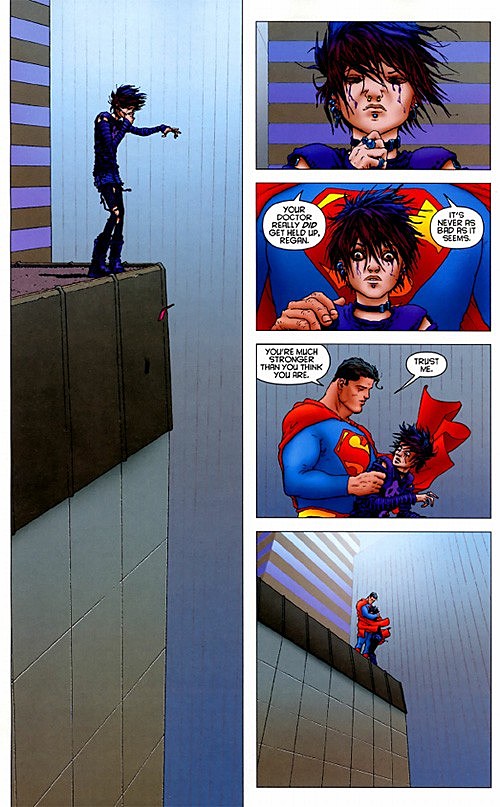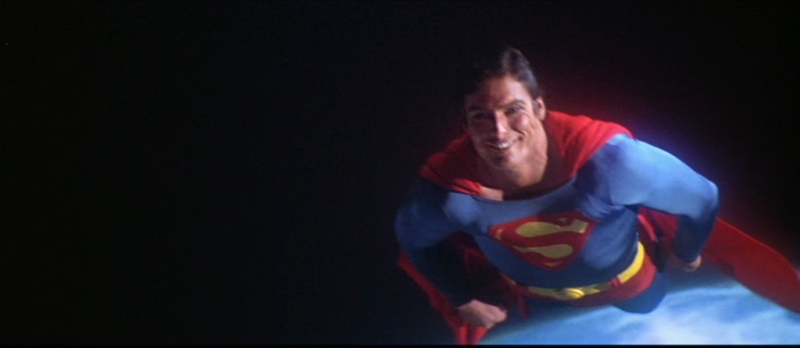Warning: Spoilers for Man of Steel, Batman v Superman: Dawn of Justice, Superman vs. the Elite, and the comic book What's So Funny About Truth, Justice, and the American Way.
The portrayal of Superman in Man of Steel and Batman v. Superman has been the source of much controversy. I don't believe that this controversy is the result not of a nefarious agenda by Zach Snyder or anyone at DC to undermine the character's integrity, as some (see this article) would suggest. Rather I think that their idea was too create a more conflicted but ultimately still heroic version of the character (as this article surmises). The problem is that the writing is so confused and at odds with itself that this these ideas are lost.
Lois Lane is at the heart both films understanding of Superman. To once again refer to the Mark Hughes article, Lois is meant to represent humanity for Superman. She believes in him so he hopes that others might as well. This is shown when he tells her "you are my world" right before he sacrifices himself. The problem is that, at times, it really feels like he's only interested in saving her and ignores the safety of others as a result. At the beginning of the film Superman saves her from some (alleged) African terrorists. This causes all kinds of controversy. Part of the reason for this is that mercenaries working for Lex Luthor kill a bunch of terrorists and Superman is blamed for their deaths. But Superman himself flies a guy through a concrete wall. Are we supposed to believe he didn't kill him? Is this something Snyder was thinking about when he shot the scene or did he just think that Superman flying a guy through a wall was a cool image? When Lois confronts Superman about the incident he say's "I didn't kill those men." Unfortunately this sounds like its referring to the men that Luthor's thugs killed and not the guy he flew through a wall, so it doesn't clear anything up. After this Superman proceeds to climb into the tub with Lois and (presumably) have sex. Lois herself decides to investigate the incident. Why doesn't Superman help? It seems like he's more interested in making out with Lois then with confronting these issues. A similar scene takes place in Man of Steel, after Superman kills Zod, Lois comes into the building and they embrace. Perhaps part of the problem is that the writers don't seem to know what kind of Superman story this is. Is it the good ol' fashioned kind where he saves the day and gets the girl or a more pragmatic kind where Superman's actions lead to unforeseen consequences that he then has to deal with. Tangent to this problem is the fact that both films feature so many in-your-face Jesus parallels. You can only take such parallels so far, especially if your presenting a more flawed version of Superman.
There is one scene from BvS in particular, involving Jonathan Kent, that I think gets to the heart of this problem. In a flashback (or fantasy/hallucination I'm not really sure) Jonathan tells Superman a story about saving his farm from a flood which only ended up diverting it to a nearby farm whose horses ended up drowning. This haunted Jonathan for a long time and gave him nightmares. It was only when he met Martha that he was finally able to move past it. The idea here is that Martha gave him something to live for and made him realize that the best any man can do is to try to do the right thing in the moment. We can't always predict or control the consequences of such actions. The problem is, for one thing. that this message is two fold. Jonathan says, "She (Martha) gave me faith that there's good in this world. She was my world." The second sentence could indicate that being with Martha, effectively, allowed him to turn his back on his past mistakes and on the worlds problems. This is especially troubling when you have Martha telling Clark stuff like "I never wanted this world to have you" and "You don't owe this world a thing". Also, when Superman seems to have such an uncanny way of knowing when Lois is in danger it sort of feels like he's obsessed with her. This idea is further enforced during Batman's vision of the future (at least I think that's what it is) where Superman appears to be a despotic and violent tyrant. In this "hallucination" Flash tells Batman that he was right about Superman and that Lois Lane is the key. So when Superman tells Lois "this is my world. You are my world", before sacrificing himself, it's hard to know if he's doing it for humanity, or just for Lois. Another problem with this whole message about trying to do the right thing in the moment is that it runs counter to what Jonathan told Clark in the first film, that he should be willing to sacrifice people's lives for the greater good. In general I don't really understand what Jonathan wants for Clark or how Clark sees him. Superman and Lois have a conversation in the middle of the film and he says "all this time I've been living my life the way my father saw it, righting wrongs for a ghost." At first I thought he was talking about Jor El, because it seems like his actions have been much more in line with his philosophy than with Jonathan's. It was only when he says, "Superman was never real, just the dream of a farmer from Kansas" that I realized who he was actually talking about.
So how is Superman seen by fans traditionally? What does it mean to stand for truth, justice and the American way? Well for one thing, Superman is not supposed to represent the power or superiority of America, rather he represents the values that Americans hold dear, in particular individualism. Man of Steel tries to show this by having Superman be the first natural birth on Krypton in many years and therefore capable of choosing his own destiny, unlike Zod and all the other Kryptonians who were bred for a specific purpose. This message, like so many others the film, gets lost in the shuffle. Pa Kent at one point tells him, "You have to decide what kind of man you want to be Clark" but he also keeps insisting that Clark has a destiny and is meant for greater things. These messages contradict each other. More importantly,we never really get to see Clark choose who he wants to be. He just wanders around somewhat aimlessly until he stumbles on the Kryptonian ship and Jor El gives him some much needed direction.
 |
| Contrast this page from All Star Superman with this |
Superman is also seen as a kind of working class hero. In the very first Superman story ever published, Action Comics #1, we see him rescue a small business owner from the machinations of a powerful bank that he owes money to. Also, Superman's an alien immigrant who works a fairly low paying job at as a writer for the Daily Planet. Contrast this to Batman, a rich playboy who spends his nights beating up low level thugs. Batman v Superman tries to explore this concept by having him pursue a story about Batman being a menace and preying on the underprivileged, but it goes nowhere and he never really seems to come to an understanding about Batman.
Most importantly Superman is a symbol of hope. Not because he's always their to save the day but because he always tries to do the right thing and believes that humanity can aspire to the same ideal. This is where the film's Jesus iconography really misses the point: Superman's not inspiring because we believe in him but because he believes in us. This gets back to what I was saying about Pa Kent, that he seems to be telling Superman to always try to do the right thing in the moment. As I already explained this message is really mishandled. Perhaps the best illustration of this is Superman's line, "No one stays good in this world." That's the most un-Superman thing he could possibly have said.
 |
| -S.H.I.E.L.D. takes the world as it is, not as we'd like to be. And it's getting damn near past time for you get with that program, Cap. -Don't hold your breath. |
Given the largely negative response to Man of Steel and especially to Batman v Superman, it seems like moviegoers, like the citizens of Metropolis in Superman vs. the Elite, may be rejecting this darker, conflicted Superman as well. Maybe, when he inevitably rises from the grave, Cavill's Superman will be the man we all know and love once again, the one that inspires us to be our better selves. Perhaps that sounds naive but hey, a guy can hope right?







No comments:
Post a Comment